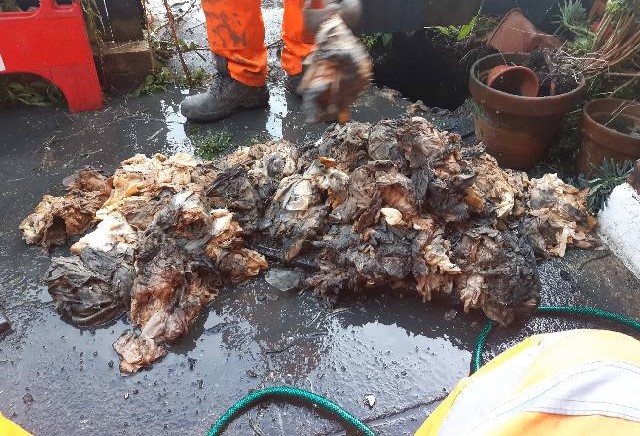Engineers clear massive blockage from Wimbledon sewer
Monday 24th February 2020 12:00

Thames Water has urged customers not to put wet wipes, tampons and other “unflushables” down their toilets after a huge blockage flooded a property in South London.
Engineers pulled around a tonne of the material, known as “rag”, out of a sewer in Wimbledon after it had caused raw sewage to spill out in to a home.
The disgusting mass, which was in a private pipe, took more than six hours to clear and measured almost two metres long and half a metre wide.
Engineer Gary Norman, who helped clear the blockage, said: “In the 30 years I’ve been clearing drains I’ve never seen so much in a customer’s pipe.
“It took us nearly all day to clear, using rods, pressure jets and pretty much every bit of kit we had on board. When it was out it was longer than me lying down and twice as high.
“We deal with this every day so we’re urging everyone not to put wet wipes down their toilets, to make our lives and theirs easier.”
“Unflushables”, which also include nappies, condoms and sanitary items, don’t break down in pipes and can combine with fats, oils and grease to create fatbergs: huge, solid masses which are difficult to clear and can cause raw sewage to build up and flood homes, businesses and the environment.
In 2019, engineers cleared more than 1,500 blockages from sewers in Merton borough. Almost 700 of these were caused by “unflushable” items, while nearly 600 more were due to fats and oils.
From 2017 to 2019, an average of five blockages were cleared in the borough for every 100 households.
Thames Water spends £18 million every year clearing 75,000 blockages from its sewers, unclogging five house blockages and removing 30 tonnes of material from just one of its sewage treatment works every day.
Instead of pouring fats and oils down the sink, customers are advised to collect them in a container, such as a yogurt pot or jam jar, and leave them to cool down before scraping them in the bin. Wet wipes, nappies and other toiletries should also be binned rather than flushed down the toilet.
Matt Rimmer, Thames Water’s head of waste networks, said: “Sewer blockages caused by unflushable items being put down toilets and sinks pose a massive problem, risking raw sewage backing up in to homes or businesses and costing millions of pounds to clear.
“They can cause massive and disgusting fatbergs that take a great deal of effort and teamwork to clear and get the sewer working well again.
“We’d urge everyone to help by only flushing the 3Ps – pee, poo and paper – as well as disposing of fat and oils in the bin, not the sink.”
Find out more about our campaign 'Bin it - don't block it'.
